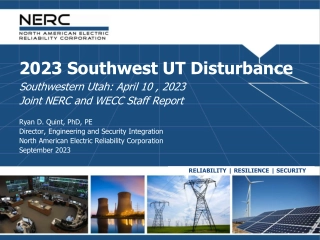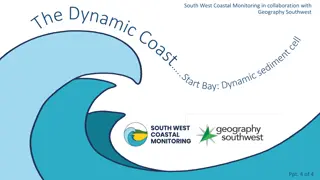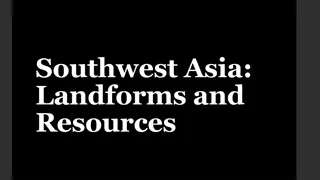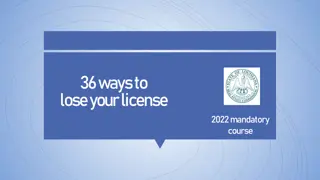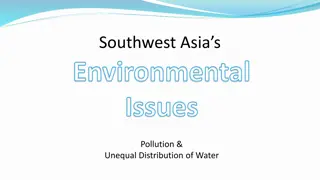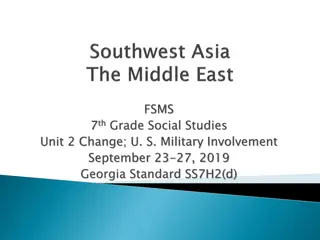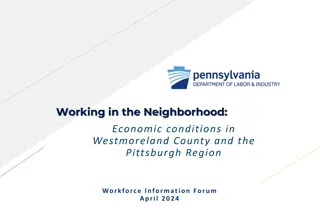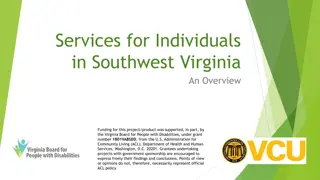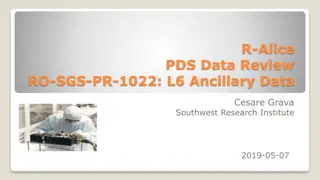
Southwest Flight 1455: Accident Analysis and Recommendations
"Explore the detailed analysis of Southwest Flight 1455, focusing on the accident history, pilot profiles, key factors, and recommendations for improved safety procedures. Discover the critical role of external pressures, communication breakdowns, and cockpit leadership in the incident. Learn valuable lessons for aviation safety."
Download Presentation

Please find below an Image/Link to download the presentation.
The content on the website is provided AS IS for your information and personal use only. It may not be sold, licensed, or shared on other websites without obtaining consent from the author. If you encounter any issues during the download, it is possible that the publisher has removed the file from their server.
You are allowed to download the files provided on this website for personal or commercial use, subject to the condition that they are used lawfully. All files are the property of their respective owners.
The content on the website is provided AS IS for your information and personal use only. It may not be sold, licensed, or shared on other websites without obtaining consent from the author.
E N D
Presentation Transcript
SOUTHWEST 1455 Connor Hennebry
OVERVIEW Accident History Pilots Key Factors External Pressures Communication Breakdown Cockpit Leadership Gradient Recommendations
ACCIDENT HISTORY Las Vegas to Burbank March 5th2000 Delayed for over 2 hours, Left at 1650 When approach Began, ATC told them to stay at 230 knots or greater Fast and High Touched down 50+ knots fast
PILOTS Captain 52 years old First class medical Several type ratings Corporate background 5,302 hours PIC 737 737 recurrent Oct. 29 1999 8 hours of sleep Moderate exercise Mild mannered First Officer 43 years old First class medical Military background 2,522 hours 737 8 hours of sleep Moderate exercise Exemplary first officer
PILOTS No drugs or alcohol were found to be in the pilots bodies after the accident
KEY FACTORS External pressure Breakdown in communication Cockpit leadership gradient
EXTERNAL PRESSURES The flight was late Arriving early/avoiding delays saves money Cause crew to neglect procedure
COMMUNICATION BREAKDOWN With ATC Within the Crew Final approach callouts Possibly cause by uneven cockpit gradient
COCKPIT LEADERSHIP GRADIENT Personality vs. Behavior The captain s behavior tilted the gradient Flaps and airspeed Captain flaps thirty, just put it down. Whoop whoop pull up It s alright. First Officer ..
RECOMMENDATIONS Airlines should implement better procedures Pilots go around Do not sacrifice safety for time Communication ATC and crew
QUOTES FROM THE PILOTS Captain First Officer "My fault . . . my fault. When asked if he made the callouts in an interview - "Well, there goes my career. No, I don't think so. Not sure. I'd be surprised if I did. "high and hot "You stupid [expletive]"
IMAGES http://bradleyaccounting.com.au/wp-content/uploads/2015/05/Saving- time-and-money.jpg http://cbsnews1.cbsistatic.com/hub/i/r/2000/03/07/c9cf23c3-a642-11e2- a3f0- 029118418759/thumbnail/620x350/1315f13815762ab88c1f33a29f6556f1/imag e168850x.jpg http://e28-535i.com/upload/GASPIC.jpg https://upload.wikimedia.org/wikipedia/commons/thumb/d/dc/Primary_Flig ht_Display.svg/2000px-Primary_Flight_Display.svg.png http://www.clipartbest.com/cliparts/Kcn/o8B/Kcno8BjKi.png
SOURCES http://www.ntsb.gov/investigations/AccidentReports/Reports/AAB0204.pdf https://en.wikipedia.org/wiki/Southwest_Airlines_Flight_1455 http://articles.latimes.com/2001/jul/11/local/me-20945

